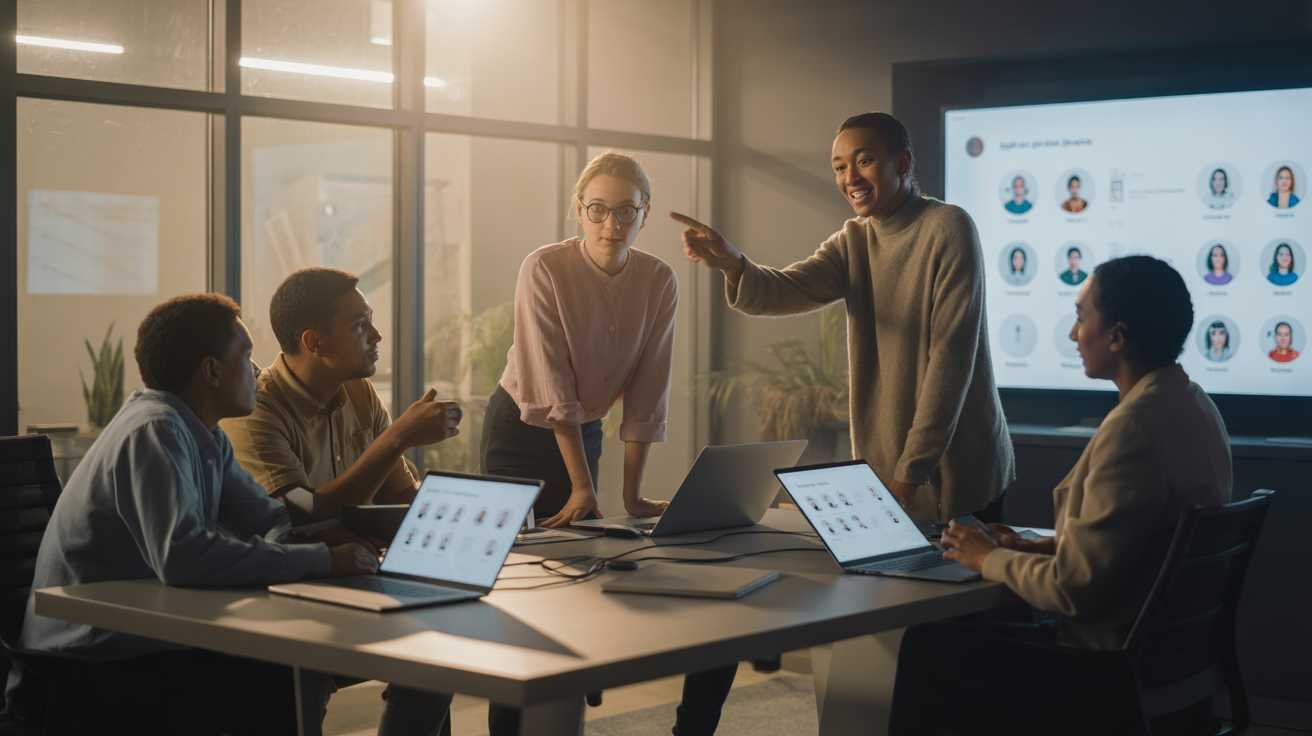The Power of Social Learning in Modern Coroner Education
In today’s fast-paced digital era, coroner education demands more than static lectures or isolated e-learning modules. It thrives on connection, shared insights, and collective discovery. Social learning – where learners engage, discuss, and build knowledge together – is revolutionizing how coroners are trained, certified, and continually upskilled. Imagine a digital platform buzzing with activity: students debating case studies in real-time, experienced coroners sharing insights from real investigations, and mentors guiding discussions that mirror the gravity and detail of fieldwork. This interactive environment transforms learning from a passive experience into a vivid, emotionally charged journey. In coroner education, where precision, ethics, and empathy intertwine, social learning isn’t just a luxury – it’s a necessity. It bridges the gap between theory and application, fostering collaboration that can save lives and ensure justice. The institutions that integrate social learning now are pulling ahead, cultivating communities of motivated, well-prepared professionals. Every passing day without such integration means missed opportunities for engagement, retention, and meaningful transformation. This is not the future – it’s the urgent present. Those who delay are risking being left behind in a field that demands constant growth and peer-driven excellence.
Building Digital Communities That Mirror Real-World Collaboration
To make coroner education truly effective, digital classrooms must evolve into living, breathing communities. Imagine a learning hub where every post, comment, and peer response carries the weight of professional insight. The design of these communities must encourage authenticity and empathy. Learners should feel they are contributing to something greater – a collective understanding of the human condition through forensic science. Digital forums, live group chats, and video collaboration tools serve as the modern lab bench, the new autopsy room of learning exchange. When a student uploads a virtual case study, peers respond not just with academic answers but with emotional and ethical perspectives, mimicking the collaborative process coroners rely on in real investigations. This sense of digital camaraderie transforms study sessions into shared missions. Each discussion feels like a heartbeat in a larger organism of inquiry and compassion. The institutions pioneering this style of learning report dramatically higher engagement rates and learner satisfaction. The message is clear: the future of coroner education belongs to those who can recreate the energy, challenge, and mutual respect of real-life forensic collaboration within their virtual environments.
Integrating Real-Time Peer Feedback to Elevate Learning Outcomes
Feedback is the lifeblood of learning, and in coroner education, it’s not just about correction – it’s about precision and accountability. Implementing real-time peer feedback tools allows learners to refine their reasoning, communication, and decision-making on the spot. Imagine a student reviewing a simulated case file and receiving instant analysis from peers across the country, each adding nuanced insights based on their regional protocols or investigative experiences. This immediate dialogue eliminates the stagnation of waiting days for instructor input. It nurtures a culture of collective intelligence, where every learner contributes to the continual sharpening of professional skills. Peer-to-peer assessment tools, discussion scoring systems, and AI-assisted feedback analytics create an ecosystem where every comment matters, every insight is traceable, and every improvement is measurable. For coroner education, where a single oversight can have profound consequences, such immediacy builds both confidence and competence. Institutions that adopt real-time feedback mechanisms are setting new standards for responsiveness, accountability, and educational quality. The urgency to integrate these systems cannot be overstated – because every moment of delay risks producing professionals who are underprepared for the rigor of the real world.
Gamification and Social Motivation: Turning Training into Transformation
Engagement is the beating heart of success in any educational model, but especially in coroner education. The emotional toll and cognitive intensity of the field require learners to remain consistently motivated. Gamification – when used strategically – turns dry training into an electrifying journey of progress and reward. Picture a social leaderboard showcasing top-performing students, each badge earned symbolizing mastery over critical investigative concepts. Collaborative challenges prompt learners to solve digital “cases” together, blending competition with cooperation. The sense of achievement isn’t superficial; it reinforces the gravity of the material while fostering camaraderie. Research-backed gamified systems in professional training have shown engagement increases by up to 60%. When paired with social learning tools, this approach transforms learning into an experience people crave, not dread. It drives retention, builds confidence, and encourages learners to take pride in their growth. For coroner education, the stakes are even higher. Motivation isn’t just about participation – it’s about cultivating the resilience and curiosity needed to navigate the emotional complexities of forensic work. Every badge, every shared success becomes part of a larger mission: ensuring that tomorrow’s coroners are not only skilled but passionately dedicated to truth and justice.
Leveraging Video Collaboration and Live Simulation Tools
The impact of video-based collaboration in coroner education cannot be overstated. Traditional lectures fall short of capturing the nuance and immediacy required to master forensic detail. Live simulation tools bridge this gap, allowing learners to work together in virtual environments that replicate real autopsy procedures, evidence collection, and case reconstruction. Imagine a class where students, guided by licensed professionals, examine high-definition visuals of medical specimens in real-time. They annotate findings, debate interpretations, and practice reporting – all while collaborating across continents. This blend of social interaction and immersive technology transforms passive observation into active, sensory-rich learning. Platforms offering these features often integrate with secure cloud systems, ensuring data protection, verified credentials, and privacy compliance. Institutions leading in coroner education now recognize that without visual collaboration, learners cannot achieve the same level of applied skill or confidence. There’s a growing urgency for schools and professional programs to adopt these innovations before their competitors dominate the market. The question isn’t whether to integrate video collaboration – it’s how fast you can do it before your learners turn to more dynamic, forward-thinking programs.
Data-Driven Social Learning: Measuring What Truly Matters
In coroner education, outcomes must be measurable, reproducible, and validated. Social learning platforms now provide data dashboards that track collaboration metrics, engagement patterns, and competency progression. Every comment, peer review, or group session becomes a data point in the learner’s development journey. Educators can identify who contributes meaningfully, who struggles with complex ethical discussions, and who leads effectively under pressure. This transparency fuels continuous improvement. Institutions can prove that their graduates are not only technically proficient but also emotionally and ethically prepared for real-world demands. Incorporating analytics into social learning ensures that no learner slips through unnoticed and that the entire cohort benefits from visible progress benchmarks. The competitive edge here is immense – schools using these analytics can advertise verified success rates and evidence-based training quality. In an era where accountability defines reputation, coroner education programs must harness data-driven tools to stay relevant. Failing to do so risks falling behind institutions that can prove, with hard numbers, the superior preparedness of their graduates. The urgency is real – because data doesn’t just tell a story; it decides who leads the future of professional education.
Security, Licensing, and Verified Credentials in Social Learning Platforms
Security and verification are non-negotiable in coroner education. Learners handle sensitive case studies, medical data, and ethical analyses that require the highest level of digital protection. Modern social learning platforms integrate verified identity systems, licensed instructor databases, and encrypted data channels to maintain integrity at every interaction. Picture a student submitting a virtual autopsy report through a secure portal, knowing their data is protected and their progress recorded under a verified license. Trust builds engagement. Institutions that emphasize secure, transparent environments see higher participation and retention rates because learners feel confident their work is recognized, protected, and respected. Verified payouts for course completion, digital certificates backed by accredited bodies, and automated licensing renewals all contribute to credibility. Programs lacking these systems are fast losing learners to platforms that prioritize authenticity and compliance. This is especially crucial for coroner education, where credentials and ethical validation define professional legitimacy. Learners expect nothing less than bulletproof trust infrastructure. The time to act is now – those who fail to adopt secure, licensed learning environments risk reputational damage that no marketing effort can repair.
Enhancing Engagement with Mentorship and Expert-Led Communities
Nothing accelerates mastery in coroner education like direct mentorship. When learners can connect with seasoned coroners, forensic pathologists, and medical examiners in an ongoing dialogue, the result is transformative. Mentorship within social learning platforms bridges the generational gap, combining wisdom with digital agility. Picture a virtual lounge where learners discuss real investigative challenges under the guidance of industry veterans. The insights gained from lived experience far outweigh textbook knowledge. Mentors can share cautionary tales, ethical dilemmas, and procedural nuances that shape professional judgment. Social learning platforms facilitate this through live Q&A sessions, mentorship threads, and case collaboration channels. For learners, it’s like stepping into the field before graduation – seeing the work through the eyes of those who’ve faced it. Programs that fail to include structured mentorship risk producing graduates who are technically trained but emotionally unprepared. In a discipline as sensitive and high-stakes as coroner education, this can’t be ignored. The most successful programs are already partnering with experts to create verified mentorship networks. Delay here means missing the chance to offer what every learner craves: real connection with those who’ve walked the path before them.
Creating Urgency: Why You Can’t Wait to Modernize Coroner Education
The window of opportunity for innovation in coroner education is rapidly closing. Institutions that hesitate risk falling into irrelevance as forward-thinking competitors seize the market with socially driven, data-backed, and secure platforms. The next generation of learners expects collaboration, responsiveness, and real-world relevance. They won’t settle for outdated e-learning models. They seek engaging discussions, expert mentorship, gamified challenges, and verified recognition of their progress. The transformation is already underway, and every month without action widens the gap. Schools embracing social learning now are not just enhancing outcomes – they’re defining the standards for professional excellence. The urgency lies in acting before learners migrate to platforms that already embody this vision. The fear of missing out is justified, because in the evolving world of coroner education, success favors the bold. Institutions that commit to modern, interactive systems will dominate the field, attract top talent, and earn industry trust. The call to action is clear: upgrade, integrate, and innovate – before the momentum shifts irreversibly. To explore advanced solutions for implementing these systems, visit this resource and take the next decisive step toward future-proofing your coroner education program today.


